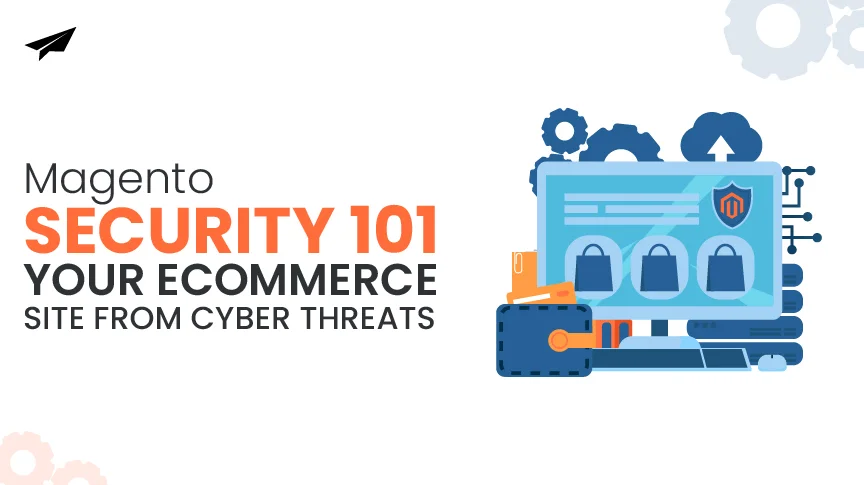Magento Security 101: Protecting Your E-commerce Site from Cyber Threats
Are you tired of cyber attacks disrupting your Magento store?
Look no further!Tekglide is one of the premier agencies in the USA, specializing in Magento Development Services. We take pride in offering Magento eCommerce services to our clients, leveraging its robust features and security.
At Tekglide, we ensure our clients understand the scale of Magento Security, from zero to one hundred, in safeguarding their stores.
But, we don’t stop at mere information storage; our priority is to educate and assist in protecting Magento eCommerce stores from cyber threats.
In our comprehensive guide, learn how to protect your Magento eCommerce store. Our developers are here to offer you the best security hacks, regardless of your industry or the size of your eCommerce business. Remember, knowing some security hacks never hurt anyone.
Common cyber attacks that impact an eCommerce website
Cyber attacks pose the most common threat to eCommerce stores, targeting valuable information and financial access.
Let’s begin by understanding the types of cyber attacks aimed at eCommerce stores. Phishing is the most common one to date, often occurring through emails, texts, or social media messages, as well as fake login pages and malicious downloads.
Meanwhile, malware or ransomware can affect stores through various activities and actions. E-skimming involves stealing credit card details and personal data, which can result from phishing attacks, XSS, or even vulnerabilities in third-party websites.
XSS is a type of security vulnerability and occurs when attackers put corrupt scripts into websites viewed by other users. These scripts can hijack user sessions, steal sensitive data, or deface websites.
To prevent XSS attacks, several measures can be employed. Firstly, utilize Content-Type and X-Content-Type-Options headers to ensure browsers interpret responses correctly. Additionally, implement Content Security Policy (CSP) as a final defense to mitigate the severity of any remaining XSS risks.
Basics of Magento Security
Are you a Magento eCommerce owner yet to learn what features Magento Security provides?
Magento eCommerce features a pretty extensive security tool.
Let’s start with the basic security features.
Magento Security includes powerful built-in security features like two-factor authentication, which safeguards eCommerce security; it requires customers to confirm their sign-in through a second method, for example, a text message or app notification and a password.
Secure FTP ensures the protection of sensitive customer data and financial information.
Additionally, Magento security contains SSL certificates and a robust access control system while regularly releasing security fixes to address potential vulnerabilities.
These security fixes, also known as Magento security patches, are software applications created to enhance the security of eCommerce websites.
Some of the Magento security patches observe suspicious admin access activity, provide backup solutions, and restrict permission to sensitive parts of the store. They offer an added layer of protection against cyber attacks by strengthening login security, detecting probable vulnerabilities, and conducting regular security reviews.
The latest security patch released by Magento is Magento Open Source 2.4.7. The Magento community includes a full-page cache configuration to help mitigate risks and limit the number of automatically generated coupon codes to prevent system overload and more.
Hence, Tekglide advises Magento eCommerce owners to update their eCommerce environment for a secure one regularly. By staying up-to-date with security patches, equips the store with the latest defenses against emerging threats.
Pay attention to the importance of timely updates in safeguarding your Magento store against cyber attacks.
Security Hacks to keep your Magento eCommerce safe
Now, here is the leading tea.
The proven practices to implement on your Magento eCommerce are safe and keep all cyber attacks at bay.
Choose a Good Website Hosting Provider
First and foremost, choose a good website hosting provider. It is important to ensure fast loading time and gain skilled technical support. It will also keep the overall security of your Magento eCommerce store in check.
But how do you know what the attributes of a good hosting provider are? They should offer the following services:
- Restricted access to secure information
- Backups and easy rebuilds
- Malware detection
- Hardware detection
Updating Your Magento Store
Magento comes with new, better, and improved updates every year. These updates are loaded with bug patches and security fixes that resolve weaknesses. You are required to be up-to-date with regular updates; you close the open door to cyberattacks.
We have noticed that the eCommerce websites operating on the older Magento software are more overexposed to various malware attacks.
Installing An SSL Certificate
SSL, aka secure sockets layer, is a type of digital certificate that authenticates a website’s identity and enables an encrypted connection.
An SSL certificate makes an encrypted link between a website server and browser to secure all online transactions and protect sensitive customer data.
Installing an SSL certificate on the Magento eCommerce Store helps add a blanket of security. It’s like passing through a retina scanner to enter the bank’s vault.
Run Magento Security Scans
The easiest, running Magento security scans to address and secure your eCommerce store against vulnerabilities:
- Security scans use specialized tools and techniques to identify vulnerabilities and security risks.
- Prevention against cyberattacks.
- Detection of threats, including XSS attacks, SQL injection attacks, and unauthorized access attempts.
- They can also identify performance and usability issues.
Secure with Extensions & Update Code Security
Secure your eCommerce store with appropriate extensions. Use extensions only from the Adobe Commerce Marketplace or the solution integrator for guarantee.
Before integration, review the extension code for security.
Update the code security by auditing your code and ensuring that log files, .git directories, SQL tunnels, database dumps, php info files, or any other unprotected files are not accessible or publicly visible. These files can be exploited in a cyber attack.
Hire A Magento Development Agency
Are the above steps looking too technical or time-consuming?
Then, hiring a Magento development agency to ensure your Magento eCommerce website is bulletproof is a good idea.
Our certified Magento agency will use tried-and-tested methods, tools, and technologies to secure your website from top to bottom.
Conclusion
To conclude, eCommerce websites are the most tempting targets for cyberattacks, mainly because they deal with financial transactions.
Hence, being aware and educated regarding preventative measures for making your eCommerce store is necessary whether or not you have a technical background. But if there is any query we haven’t discussed in our blog and you would like help, grab a free consultation call with our 24/7 available and certified Magento developers.







